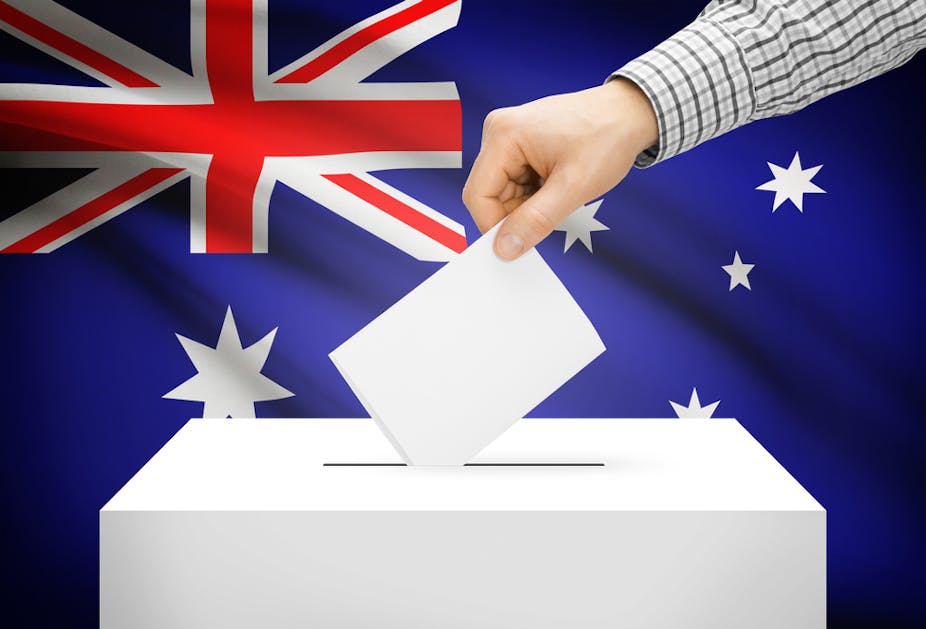Queenslanders will soon head to the voting booths to either oust or re-elect the Newman government and no doubt some will be wondering why. “Why must I vote or be fined? Why must I be forced to choose who leads my society when I’d rather save myself the trip and stay home?”
Victorian Liberal MP Bernie Finn criticised Australia’s compulsory voting laws after the Victorian state election in November. He said:
To force people to vote who don’t want to be there, who don’t know what they are doing, is frankly quite ludicrous.
While, at first glance, Finn’s claims might ring true, many experts consider Australia’s electoral system to be one of the finest in the world. The majority of Australians apparently share this view: 70% approve of compulsory voting.
For decades, compulsory voting has done what it was supposed to do: maintain high and socially even turnout levels that are the envy of the industrialised voluntary-voting world. Prior to its introduction at the federal level in 1924, turnout was hovering in the 50–60% range (of registered voters). Since then, it has remained steady for many decades at around 93%.
The system is easily accessible, well-managed and, despite some rare but highly publicised cases, controversy-free. Without compulsory voting, turnout would be considerably lower at around 55-60% of the eligible population, mimicking similar democracies such as the US or Canada.
Switching to a voluntary system, as recently advocated in The Conversation, would plunge Australian democracy into the same crisis of citizenship that democracies everywhere in the voluntary-voting world are going through: that is, the rapid decline into gerontocracy as voters – especially young people – turn their backs on voting in droves.
While Australia’s young are less inclined to vote than older cohorts, because of compulsory voting 83% of 18-25 year olds still turn out to vote. Compare this to Britain where only around 44% of young people vote, or Canada where the figure hovers at around 37 to 38% or, worse still, the US. There, in the recent midterm elections, only 22% of young people bothered to cast a ballot.

In the US, older people are now three times more likely than the young to vote. This is where Australia would be heading without the legal requirement to participate politically.
The obvious retort is: “If the young don’t want to vote, then something is obviously wrong.” This is probably true, but we know for certain that failure to vote does not make things any better – quite the reverse.
Unfortunately, the young in other settings have yet to join the dots about the effect of their failure to vote on the way governments treat them.
Many studies have indicated that government attention and spending are directly related to the size of electorate cohorts. Older people vote and so governments spend far more per capita on them than they do on the young. Governments are also a lot more responsive to the policy concerns of older voters.
This is just common sense: politicians aren’t idiots, they know who their customers are. As British journalist Sophy Ridge recently observed, given the voting patterns of Britain’s young, it is little wonder that:
… the coalition government has vowed to protect pensioner benefits (from free bus passes to TV licences) when every other age group has shouldered cuts. Or that the Conservatives are actively considering ending housing benefits for the under 25s.
Is compulsory voting really so onerous that we would want to trade our enviable voting levels for the freedom to abstain? 18th-century Genevan philosopher Jean-Jacques Rousseau famously wrote:
As soon as any man says of the state: ‘What does it matter to me?’, the state may be given up for lost.
Being enabled to enjoy the benefits of living in a democracy instead of, say, an oligarchy or a gerontocracy requires participatory effort. Democracy requires a bit of input from citizens otherwise it ceases to exist. It also demands a willingness to give up some freedom and time.
Is this really too much to ask given how easy it is to vote in Australia? Compared to just about any other system anywhere, voting here is a fairly painless affair for electors because our electoral commissions do most of the work for us.
Compare the situation to the US where registration procedures are cumbersome, voting lines are long and legal and ergonomic obstacles to voting are myriad. Here in Australia it is simply a matter of filling in an enrolment form once (the AEC does all the updating now) and turning up to the local school to vote at booths where the lines are short, staff are helpful and ballot papers are in never-ending supply.
Libertarians like Finn think that the cost of losing their freedom to stay away on polling day is too high. But what about the real-life cost to freedom of being poor, homeless, unemployed and under-employed? In every advanced voluntary system the world over, the less likely you are to vote, the more likely you are to experience one, some, or all of these things.
But in compulsory systems where voting is universal and socially even, government attention and spending is more evenly distributed. Simply put, there is less wealth inequality in compulsory systems.
We all like to complain about politicians and politics but things are much better here than many Australians realise. Compared to most voluntary regimes, we not only have less social inequality, but lower levels of corruption and higher levels of satisfaction with our democracy.
Australians also exhibit fairly high levels of trust in government and have been found to place more value in both voting and obeying laws than citizens in comparable voluntary-voting settings. This is probably related to the fact that almost all eligible Australians are involved in the appointment of their lawmakers.
Unless we want Australia’s electoral democracy to wither and become the exclusive domain of older, richer elites, we had better keep our present system.

